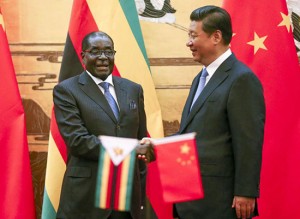 There was much hype in the local press. Was China going to bail out Zimbabwe, with the ‘look east’ policy finally paying off? In advance of the ZANU-PF Congress, was the Chinese president going to help with the succession issue, publicly backing Vice President Emerson Mnangagwa, who has long ties with China? Was this going to be the turning point for Zimbabwe’s politics and economy?
There was much hype in the local press. Was China going to bail out Zimbabwe, with the ‘look east’ policy finally paying off? In advance of the ZANU-PF Congress, was the Chinese president going to help with the succession issue, publicly backing Vice President Emerson Mnangagwa, who has long ties with China? Was this going to be the turning point for Zimbabwe’s politics and economy?
Well no. As with many other engagements with China over the past few years, the expectations were not matched with the reality. China certainly values its partnerships in Africa, and connections with Zimbabwe are certainly important. Chinese interests in mineral exploitation in the country are significant, and as a sympathetic country not captured by Western interests in the southern African region, Zimbabwe can be important to Chinese diplomatic efforts. But of course Zimbabwe is small fry for China – even its significant mineral wealth – and this is not a new ‘colonisation’ as some suggest.
In China’s ‘new normal’ – characterised recently by a slowing economy, overvalued currency, collapsing stock markets – China is attempting to switch from resource-dependent industrial growth to a more service-oriented, knowledge-based economy. This will take time, but the heat has gone out of China’s voracious drive to acquire resources in Africa, and elsewhere, with trade declining. This has had a major impact on resource-dependent economies in Africa and elsewhere, most notably Brazil.
So Zimbabwe may be more important as a symbolic friend, one where connections and networks that date back to the liberation war, and early careers of the now aging generation of ZANU-PF politicians. Of course the political economy of the relationship is very different to the 1960s and 70s, but these connections of solidarity matter – on both sides. And both are happy to make use of them, whether through joint deals on land, support for the mining industry, investments in power and infrastructure, security sector support or diplomatic solidarity in Africa – President Mugabe is after all the chair of the African Union.
Zimbabwe hit the international headlines with the (re)announcement that Zimbabwe would adopt the yuan – China’s currency – as part of its multi-currency basket (it has actually been so since 2014), down-grading in turn the South African rand, which has suffered badly recently. This will have virtually no tangible effect, and the US dollar will continue as the main currency for now. Instead, it was an importantly symbolic move, as China is keen to move the yuan to the status of an internationally tradeable currency. Just as the British PM and Chancellor offered the City of London as a place for international trading, so too President Mugabe – bizarrely on the same diplomatic and economic mission – could offer China the opportunity to symbolically showcase its currency, even if in one of the most depressed economies in the region.
There were of course agreements and signings and some tangible offers as part of the visit. There was the long hailed support for the rehabilitation of the Hwange power station; a commitment to help build a new parliament building; there was the promise of a debt write off to the tune of $40m; and there were other promises of investment into the future. Chinese investment in Zimbabwe of course continues, both through official state-facilitated channels and more informal routes – whether small-scale mining operations or deals with A2 farmers made by Chinese companies. The security services, with their strong historic links to China, are an important conduit – including in retail and agriculture. And Zimbabwe will in turn continue its strong trade in tobacco, and occasionally elephants, with China.
It was a whistle-stop tour, and the delegation was soon gone. But long after the posters on the airport road come down, the connections will remain important, and other investors, diplomatic missions and aid agencies will have to take note.
This post was written by Ian Scoones and first appeared on Zimbabweland
Post published in: Featured

